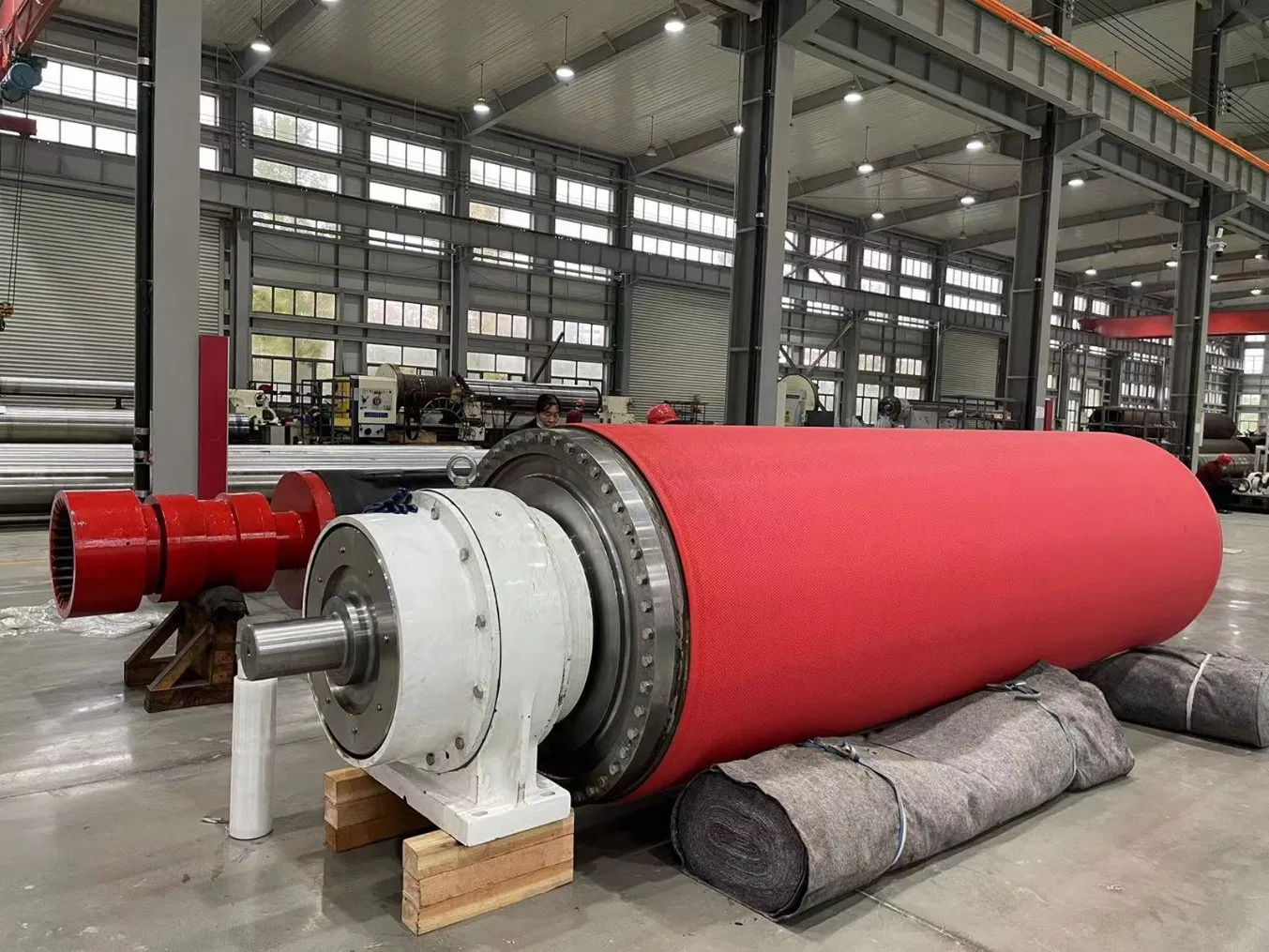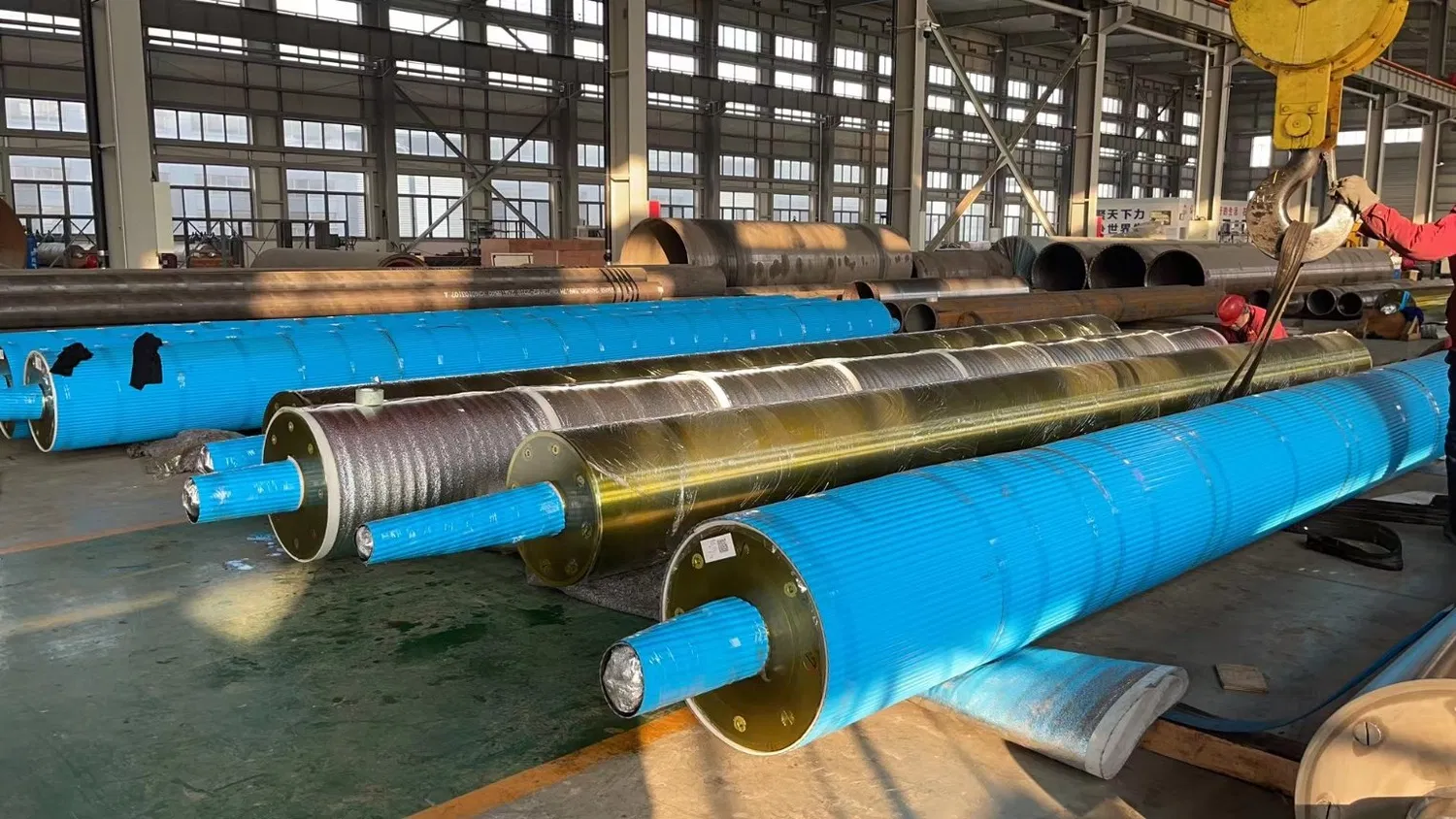Have you ever stopped to consider the sheer complexity behind something as seemingly simple as a sheet of paper? From the towering forests to the intricate machinery that transforms wood pulp into the pages of your favorite book or the packaging for your online order, every step is a marvel of engineering. At the heart of this transformation lies a component often overlooked but absolutely critical: the paper machine roll. And behind every high-quality roll stands a specialized entity – the paper machine roll manufacturer.
To be honest, without these precision-engineered rolls, the modern paper industry as we know it simply wouldn't exist. They are the unsung heroes, guiding, pressing, drying, and finishing the paper web at incredible speeds, often operating under extreme conditions of heat, pressure, and chemical exposure. The demands placed on these rolls are immense, requiring unparalleled durability, dimensional accuracy, and surface integrity. This is precisely why the selection of a reputable paper machine roll manufacturer is not just a preference, but a fundamental necessity for any paper mill aiming for efficiency, quality, and longevity.
The Heartbeat of Paper Production: Understanding Paper Machine Rolls
Paper machines are colossal structures, stretching hundreds of feet long and operating continuously, often 24/7. Within these behemoths, rolls perform a myriad of functions across different sections:
- Forming Section: Here, rolls help drain water from the pulp slurry, forming the nascent paper web. Suction rolls, couch rolls, and breast rolls are crucial.
- Press Section: In this area, rolls apply immense pressure to squeeze out more water, consolidating the paper web and increasing its dry content. Press rolls, blind-drilled rolls, and grooved rolls are common.
- Dryer Section: Heated rolls evaporate remaining moisture, transforming the damp web into a stable sheet. Dryer cylinders and felt rolls dominate this section.
- Calender Section: These rolls smooth and compact the paper surface, influencing its thickness, gloss, and printability. Calender rolls are highly polished and precise.
- Reel and Winder Sections: Finally, rolls guide the finished paper onto large reels and then slit and rewind it into smaller, shippable rolls. Reel spools and winder drums are key.
Each type of roll has specific design requirements, material compositions, and surface finishes tailored to its function. Interestingly enough, a single paper machine can utilize hundreds of these rolls, each contributing to the overall quality and efficiency of the final product. The complexity and variety underscore the specialized knowledge required from a paper machine roll manufacturer. They aren't just making generic cylinders; they're crafting highly specialized components for a demanding industrial environment.
The Unseen Engineering: What Makes a Top Paper Machine Roll Manufacturer Stand Out?
Frankly speaking, not all roll manufacturers are created equal. The distinction between an average supplier and a truly leading paper machine roll manufacturer lies in their commitment to precision engineering, material science, and continuous innovation. It's a field where experience truly matters, as the nuances of roll performance are often learned through decades of practical application and problem-solving.
Material Science and Metallurgy Expertise
The foundation of a high-performance roll is its material. A top manufacturer possesses deep expertise in metallurgy, understanding how different alloys and composites respond to the stresses of paper production. For instance, rolls in the press section might require specific cast iron or steel alloys with superior strength and fatigue resistance, while dryer rolls need excellent thermal conductivity and corrosion resistance. Coatings, too, are critical – from rubber and polyurethane for grip and water removal to ceramic and tungsten carbide for wear resistance and release properties. Many experts agree that the selection and application of the right material and coating can significantly extend roll life and improve paper quality.
Precision Machining and Grinding
The tolerances in roll manufacturing are incredibly tight. A roll's surface must be perfectly cylindrical, with minimal runout and precise crown profiles (a slight taper or bulge designed to compensate for deflection under load). This requires state-of-the-art CNC machining centers, precision grinders, and highly skilled technicians. I've found that even microscopic imperfections can lead to uneven paper thickness, web breaks, or premature roll wear, directly impacting a mill's bottom line. A leading paper machine roll manufacturer invests heavily in metrology equipment to ensure every roll meets stringent specifications, often down to microns.
Dynamic Balancing and Vibration Control
Paper machine rolls operate at very high rotational speeds. Any imbalance, even slight, can cause severe vibrations, leading to premature bearing failure, structural damage to the machine, and significant quality defects in the paper. Therefore, dynamic balancing is a non-negotiable step in the manufacturing process. Expert manufacturers utilize sophisticated balancing machines to ensure that rolls run smoothly and stably at operational speeds, minimizing downtime and maintenance costs for their clients. This meticulous attention to detail is what sets them apart.
From Concept to Core: The Intricate Process of Roll Manufacturing
The journey of a paper machine roll from raw material to a fully functional component is a complex, multi-stage process demanding meticulous attention at every turn. It's a testament to industrial craftsmanship and engineering prowess.
Design and Engineering
It all begins with design. Based on the specific application, machine type, and desired paper properties, engineers utilize CAD/CAM software to create detailed blueprints. This includes determining the optimal core material, shell thickness, internal cooling/heating channels, bearing journals, and surface profile. For custom industrial rolls, this phase is particularly collaborative, as the manufacturer works closely with the paper mill to tailor solutions for unique challenges.
Material Selection and Casting/Forging
Once the design is finalized, the appropriate raw materials are selected. For large rolls, this often involves specialized casting of iron or steel alloys, or forging for high-strength applications. The quality of the initial casting or forging is paramount, as internal defects can compromise the roll's integrity later on.
Rough Machining and Stress Relieving
The raw casting or forging is then rough-machined to remove excess material and bring it closer to the final dimensions. After rough machining, the roll often undergoes a stress-relieving heat treatment. This process is crucial to eliminate internal stresses introduced during casting or machining, preventing warping or cracking during subsequent operations or in service.
Precision Machining and Grinding
This is where the true precision comes into play. Using advanced CNC lathes and grinding machines, the roll's surface is meticulously machined and ground to its exact specifications. This includes achieving the precise diameter, concentricity, and surface finish. For rolls requiring a specific crown profile, sophisticated grinding techniques are employed to create the exact curvature.

Coating Application (if applicable)
Many paper machine rolls receive specialized coatings to enhance their performance. This can include rubber covers for elasticity and grip, ceramic coatings for extreme wear resistance and heat stability, or composite materials for lightweight strength. The application process is highly controlled, ensuring uniform thickness and adhesion. Curing processes, often involving heat, solidify the coating.
Final Inspection and Dynamic Balancing
Before a roll leaves the factory, it undergoes a rigorous final inspection. This includes dimensional checks, surface roughness measurements, and non-destructive testing (NDT) to detect any internal flaws. Crucially, the roll is dynamically balanced at operational speeds to eliminate vibrations. This step is non-negotiable for high-performance paper machine components.
Packaging and Shipping
Finally, the finished roll is carefully packaged to protect its precision surface during transit and shipped to the paper mill, ready to be installed and contribute to the continuous production of paper.
Beyond the Basics: Innovation and Customization in Roll Solutions
The paper industry is constantly evolving, driven by demands for higher speeds, improved paper quality, and greater sustainability. This pushes the paper machine roll manufacturer to innovate continuously. It's worth noting that simply producing a standard roll is no longer enough; mills often require bespoke solutions.
Advanced Coatings and Materials
Innovation in coatings is a major area of focus. New polymer composites, enhanced ceramic blends, and specialized metallic coatings are being developed to offer superior wear resistance, better release properties, improved heat transfer, and longer service life. These advancements directly translate to reduced downtime for roll changes and lower operational costs for paper mills. For instance, some coatings are designed to be hydrophobic, preventing sticking, while others are engineered for optimal heat transfer in dryer sections.
Smart Rolls and IoT Integration
The advent of Industry 4.0 has also impacted roll manufacturing. Some leading manufacturers are now incorporating sensors directly into rolls to monitor temperature, vibration, and even internal stresses in real-time. This 'smart roll' technology allows for predictive maintenance, optimizing roll change schedules and preventing catastrophic failures. It's an exciting development that promises to revolutionize roll management within paper mills, providing invaluable data for pulp and paper industry roll solutions.
Customization and Problem Solving
In my experience, a truly valuable paper machine roll manufacturer doesn't just sell products; they offer solutions. This often involves working closely with a mill to diagnose specific issues – be it excessive wear, poor paper quality, or vibration problems – and then designing a custom roll or recommending a specific coating or material modification to address that challenge. This consultative approach is a hallmark of expertise and partnership.

Partnering for Success: How to Choose the Ideal Paper Machine Roll Manufacturer
Selecting the right paper machine roll manufacturer is a strategic decision that can significantly impact a paper mill's operational efficiency, product quality, and profitability. It's not just about price; it's about value, reliability, and partnership.
Experience and Reputation
Look for a manufacturer with a proven track record and extensive experience in the pulp and paper industry. A long history often indicates stability, deep knowledge, and a commitment to quality. Check their reputation within the industry – testimonials, case studies, and peer recommendations can be very insightful.
Technological Capabilities and R&D
Assess their manufacturing facilities and technological capabilities. Do they use state-of-the-art machinery? Do they invest in research and development? A forward-thinking manufacturer will be at the forefront of new materials, coatings, and manufacturing processes, offering you access to the latest high-performance paper machine components.
Quality Control and Certifications
Inquire about their quality control processes. Do they have robust inspection protocols at every stage of manufacturing? Are they ISO certified or adhere to other relevant industry standards? Strict quality assurance is non-negotiable for components as critical as paper machine rolls.
Customer Support and After-Sales Service
A good partnership extends beyond the initial sale. Does the manufacturer offer strong technical support, installation guidance, and troubleshooting assistance? What about repair and reconditioning services? The ability to quickly respond to issues and provide ongoing support can save a mill significant time and money.
Sustainability Practices
With increasing emphasis on environmental responsibility, consider manufacturers who demonstrate a commitment to sustainable practices. This could include energy-efficient manufacturing processes, responsible sourcing of materials, and options for roll reconditioning and recycling.
The Road Ahead: Future Trends Shaping Paper Machine Roll Manufacturing
The future of paper machine roll manufacturing is poised for exciting developments, driven by the broader trends impacting the paper industry itself.
Digitalization and Automation
The integration of AI, machine learning, and advanced robotics will further enhance precision and efficiency in roll manufacturing. Automated quality control systems and predictive maintenance for manufacturing equipment will become standard, leading to even higher quality and more consistent rolls.
Advanced Materials and Nanotechnology
Research into novel materials, including those enhanced at the nanoscale, will continue to yield rolls with unprecedented properties – lighter, stronger, more durable, and with superior surface characteristics. This will enable paper machines to run faster and more efficiently, with less wear and tear.
Circular Economy and Sustainability
The focus on sustainability will intensify. Manufacturers will explore more environmentally friendly production methods, reduce waste, and develop rolls that are easier to repair, recondition, or recycle at the end of their lifespan. This aligns with the overall industry push towards a more circular economy.
In conclusion, the role of a paper machine roll manufacturer is far more profound than simply producing cylindrical components. They are innovators, problem-solvers, and essential partners in the global paper industry. Their expertise in material science, precision engineering, and continuous innovation ensures that the paper we rely on daily can be produced efficiently, reliably, and to the highest quality standards. As the paper industry continues to evolve, so too will the demands on these critical suppliers, pushing the boundaries of what's possible in roll technology.
For more detailed information, please visit our official website:Paper machine roll manufacturer
About the author: Dr. Evelyn Thorne is a distinguished industrial engineer with over two decades of experience specializing in advanced manufacturing and material science for heavy machinery components. Her work focuses on optimizing performance and longevity in demanding industrial environments, particularly within the pulp and paper sector. She regularly consults on precision engineering and sustainable manufacturing practices, making her insights invaluable to understanding the complexities of industrial roll production.


